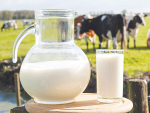Last week's subdued Global Dairy Trade (GDT) event wasn't a surprise, according to ASB economist Nat Keall.
"We'd been anticipating a relatively flat event, so the result has few implications for the current season - already in a well-advanced stage - or our early thoughts on the next one," he says. "In general, dairy prices remain heavily range-bound, with an absence of clear direction evident since prices rebounded from the lows they fell to mid last year."
Keall notes that little has happened to radically reshape the global dairy market, and to the extent that dynamics have shifted, different price drivers have moved to offset one another.
"All-up, we still feel comfortable with our $8/kgMS forecast for the current season and our $8.30/kgMS forecast for 2024/25. Risks to next season's forecast look reasonably balanced in our view for now.
"With 2024/25 milk price futures currently trading around $8.45/kgMS, up from nearer $8 when we launched our forecast, hedging some output at that kind of price could be prudent, given the balanced skew of risks."



















